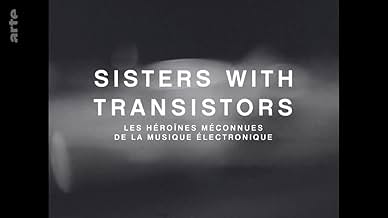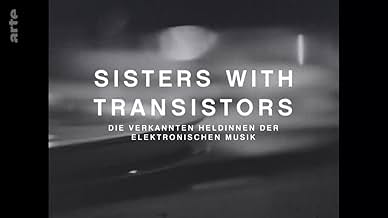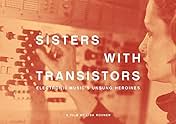Sisters with Transistors
- 2020
- 1h 26m
IMDb RATING
7.4/10
1.1K
YOUR RATING
Follows the story of electronic music's female pioneers, composers who embraced machines and their liberating technologies to utterly transform how we produce and listen to music today.Follows the story of electronic music's female pioneers, composers who embraced machines and their liberating technologies to utterly transform how we produce and listen to music today.Follows the story of electronic music's female pioneers, composers who embraced machines and their liberating technologies to utterly transform how we produce and listen to music today.
- Awards
- 2 wins & 3 nominations total
Kim Gordon
- Self
- (voice)
Jean-Michel Jarre
- Self
- (voice)
Bebe Barron
- Self
- (archive footage)
Clara Rockmore
- Self
- (archive footage)
Louis Barron
- Self
- (archive footage)
Delia Derbyshire
- Self
- (archive footage)
Brian Hodgson
- Self
- (voice)
Maggi Payne
- Self
- (voice)
Daphne Oram
- Self
- (archive footage)
Barry Bermange
- Self
- (archive footage)
- (voice)
Sarah Davachi
- Self
- (voice)
Pauline Oliveros
- Self
- (archive footage)
Pierre Schaeffer
- Self
- (archive footage)
- Director
- Writers
- All cast & crew
- Production, box office & more at IMDbPro
Featured reviews
This documentary covers some of my favorite movies, and I loved the stories of some of these men and women, but good Lord I had remove 3 stars for the constant D-tier tinnitus inducing audio. Its non-stop.
This is coming from someone who is both a huge science fi fan and a musician.
This is coming from someone who is both a huge science fi fan and a musician.
Okay so before we start, can we agree that Sisters with Transistors is a wonderful title. "This is the story of women who hear music in their heads. Of radical sounds where there was once silence. Of dreams enabled by technology". If that doesn't whet your whistle I don't know what will. It's the story of early electronic pioneers, all women. Suzanne Ciani, Clara Lockmore, Delia Darbyshire, Daphne Oram, Eliane Radigue, Bebe Barron, Pauline Oliveros, Maryanne Amacher, Wendy Carlos, Laurie Spiegel. Electronic music is often thought of as a male domain, but this music and the ability to make it on your own, without the need of anyone else, including men set it perfectly for women to express themselves openly when other area of music and society were closed to them. Still, too many of these names are largely unknown. Sisters with Transistors sets out to change that. It's a deep dive into the origins of electronic music. Analogue machines, brought to life with patch wires, switches and flashing lights. The music is warm, open, energetic, unpredictable, but it's as much about women's struggle to be seen in the world as it is to harness their creative potential. It's 90 minutes are packed with fascinating archive footage, the only new elements are voice narration with everyone from Jean Michel Jarre and Holly Herndon to Kim Gordon. It's all very DIY. Delia will run you through the concept of waveforms and tape loops, foley, pitch shifting and how The Blitz influenced her ideas of abstract sound. It's quite incredible, from Oran's Drawn Sound to Radigue's feedback experiments. Spiegel's hole punched computer music and her invention of the first music software on the Apple Mac to Barron's score for Forbidden Planet being credited as 'Electronic Tonalities' instead of music, because the establishment was scared of what was happening and Darbyshire then blowing the doors off the whole damn thing with the Doctor Who theme. I don't like Doctor Who, but my god that score is spine-tingling. Can you imagine sitting in your living room in 1963 and that sound coming from the TV in the corner. There's only one word, Powerful. To which Thurston Moore can attest to with his fingers in his ears as Maryanne Amacher threatens to make them bleed. It's exciting stuff! The Beeb is a common thread that pops up in several of these stories, with the fabled Radiophonic Workshop, a throwback to when the BBC was much braver in its programming choices. But the main thread is these woman are confident. They are the experts in their field and they know it. There's no arrogance to them though, even in the face of the sometimes condescending men interviewing them. It does what any good documentary does in being informative, but it's a journey of these women's lives, of gender inequality, of their ingenuity. "How do you exercise the cannon of classical music of misogyny with two oscillators, a turntable and tape delay" and like any good doc, it's left me wanting to research further. Not least by finding a vinyl copy of Switched On Bach, which sounds like something I need to hear with a bit of authentic crackle. There's not a single mention of seeking commercial success, it's pure art, pure expression. Sit back and let these wonderful musicians transport you.
But only with more diversity of women.
An article made me aware that this movie only features western European descendent or white women.
While it is an omage to people being overlooked it overlooks others.
A woman to many people is still mainly a white woman.
But even in electronic music there were many women of none European descendent who contributed.
I am myself fascinated with the amount of women in electronic music and this movie came out when I started to understand that I as a woman feel home in modular synthesis and electronic music.
Even more fascinated was I when seeing that there were woman like me before literally pioneering the field I feel home in.
Even more women who were and think or thought like me. Like role models I was always craving as I grew up.
I don't look at people based on their appearance. To me every woman is a woman and I was flattered seeing other women doing wonderful things. But know I am left wondering why there are only white women in the movie.
I don't think anyone had any racial intention here. It is just the white women were more easily to be rediscovered. But there are so many more out there. Women of all cultures.
It is only reflecting how much more powerful we women are if we keep digging deeper.
The reasons women of color are overlooked are the same why women in general were oberlooked. Stereotypes.
Now they try to break with stereotypes of white women thinking they were representing all women. But no.
This movie is an attempt to break with stereotyoes but it is not going far enough and is deepening stereotypes.
To be honest, I was a bit bored by the movie. I felt there was so much more to all those stories of great women and at some point I felt the makers ran out of money or so.
I think if more money would gave been 8nvested they could have and wpuld have be allowed to dig deeper.
The trailer was great, but the movie lacked the same power.
If this had been a documentry about men much more money would have been invested toshow their stories in the exciting way it was.
I recommend the movie, because for it to be of so much importance. But I believe this is just the beginning of something bigger giving all the talented women of electronic music the light they deserve to be represented in no matter what origine they were or are.
7 stars for I love how the existence of that movie moticate me becoming a woman of electronic music.
An article made me aware that this movie only features western European descendent or white women.
While it is an omage to people being overlooked it overlooks others.
A woman to many people is still mainly a white woman.
But even in electronic music there were many women of none European descendent who contributed.
I am myself fascinated with the amount of women in electronic music and this movie came out when I started to understand that I as a woman feel home in modular synthesis and electronic music.
Even more fascinated was I when seeing that there were woman like me before literally pioneering the field I feel home in.
Even more women who were and think or thought like me. Like role models I was always craving as I grew up.
I don't look at people based on their appearance. To me every woman is a woman and I was flattered seeing other women doing wonderful things. But know I am left wondering why there are only white women in the movie.
I don't think anyone had any racial intention here. It is just the white women were more easily to be rediscovered. But there are so many more out there. Women of all cultures.
It is only reflecting how much more powerful we women are if we keep digging deeper.
The reasons women of color are overlooked are the same why women in general were oberlooked. Stereotypes.
Now they try to break with stereotypes of white women thinking they were representing all women. But no.
This movie is an attempt to break with stereotyoes but it is not going far enough and is deepening stereotypes.
To be honest, I was a bit bored by the movie. I felt there was so much more to all those stories of great women and at some point I felt the makers ran out of money or so.
I think if more money would gave been 8nvested they could have and wpuld have be allowed to dig deeper.
The trailer was great, but the movie lacked the same power.
If this had been a documentry about men much more money would have been invested toshow their stories in the exciting way it was.
I recommend the movie, because for it to be of so much importance. But I believe this is just the beginning of something bigger giving all the talented women of electronic music the light they deserve to be represented in no matter what origine they were or are.
7 stars for I love how the existence of that movie moticate me becoming a woman of electronic music.
"Sisters With Transistors" (2020 release; 86 min.) is a documentary about the female pioneers of electronic music. As the movie opens, one of them comments that "technology is a tremendous liberator", allowing women to work on their own without depending on the approval or assistance of men (who dominate the industry). We then go back in time to the early 20th century and the origins of electronic music. At this point we are 10 min into the movie.
Couple of comments: this is the feature length debut of writer-producer-director Lisa Rovner. She digs deep into the origins of electronic music from the female perspective, and along the way profiles the key pioneers in this subgenre, including amont others Suzanne Ciani, Clara Rockmore, Delia Derbyshire, Pauline Oliveros, Wendy Carlos, and Laurie Spiegel. The movie does not go beyond the mid-70s, and hence no Laurie Anderson (who is the documentary's narrator). The documentary reminds us how incredibly controversial electronic music was. In fact, it wasn't referred to as "music" in the early days, but instead it was called things like "sonic propositions", and "electronic tonalities". Can you imagine that? The other thing that struck me while watching this, is how much archive footage the film makers were able to dig up on this, absolutely incredible. As a fan of electronic music going back to the early days of artists like Tangerine Dream and Klaus Schulze (yes, I know, all guys), I was more than delighted with the insights provided by this documentary.
"Sisters With Transistors" premiered at the 2020 SXSW festival to immediate acclaim. There is good reason why this documentary is rated 97% fresh on Rotten Tomatoes. It played very briefly here in Cincinnati at some point in 2021 and I kicked myself for having missed it. Thankfully, the documentary recently started streaming on Showtime On Demand and Showtime Anytime, where I caught it. If you have any interest in electronic music whatsoever, I'd readily suggest you check this out, and draw your own conclusion. I guarantee you won't be disappointed.
Couple of comments: this is the feature length debut of writer-producer-director Lisa Rovner. She digs deep into the origins of electronic music from the female perspective, and along the way profiles the key pioneers in this subgenre, including amont others Suzanne Ciani, Clara Rockmore, Delia Derbyshire, Pauline Oliveros, Wendy Carlos, and Laurie Spiegel. The movie does not go beyond the mid-70s, and hence no Laurie Anderson (who is the documentary's narrator). The documentary reminds us how incredibly controversial electronic music was. In fact, it wasn't referred to as "music" in the early days, but instead it was called things like "sonic propositions", and "electronic tonalities". Can you imagine that? The other thing that struck me while watching this, is how much archive footage the film makers were able to dig up on this, absolutely incredible. As a fan of electronic music going back to the early days of artists like Tangerine Dream and Klaus Schulze (yes, I know, all guys), I was more than delighted with the insights provided by this documentary.
"Sisters With Transistors" premiered at the 2020 SXSW festival to immediate acclaim. There is good reason why this documentary is rated 97% fresh on Rotten Tomatoes. It played very briefly here in Cincinnati at some point in 2021 and I kicked myself for having missed it. Thankfully, the documentary recently started streaming on Showtime On Demand and Showtime Anytime, where I caught it. If you have any interest in electronic music whatsoever, I'd readily suggest you check this out, and draw your own conclusion. I guarantee you won't be disappointed.
This is a well crafted documentary on the contributions of a handful notable women to early electronic music. Up through the 1960's, electronic music was effectively all experimental and this documentary focuses on this side of the medium. (So don't expect any dance music-what many people think of when they think of electronic music now days.) About the only complaint I would make about this film is something which is a common challenge for many creative works: I felt it started to lose momentum toward the end and dragged out a bit longer than it needed to.
Did you know
- Quotes
Suzanne Ciani: I couldn't get a record deal, but advertisers wanted to be on the edge.
- Alternate versionsarte television aired a 53 minute version of this documentary.
- ConnectionsReferences Forbidden Planet (1956)
- How long is Sisters with Transistors?Powered by Alexa
Details
- Release date
- Countries of origin
- Language
- Also known as
- Elektronik Kız Kardeşler
- Production companies
- See more company credits at IMDbPro
Box office
- Budget
- £500,000 (estimated)
- Gross worldwide
- $5,241
- Runtime
- 1h 26m(86 min)
- Color
- Aspect ratio
- 1.33 : 1
Contribute to this page
Suggest an edit or add missing content



























